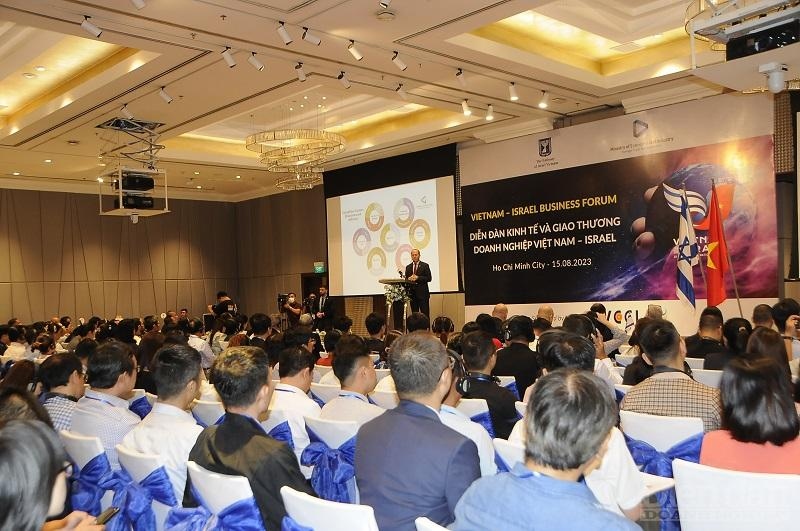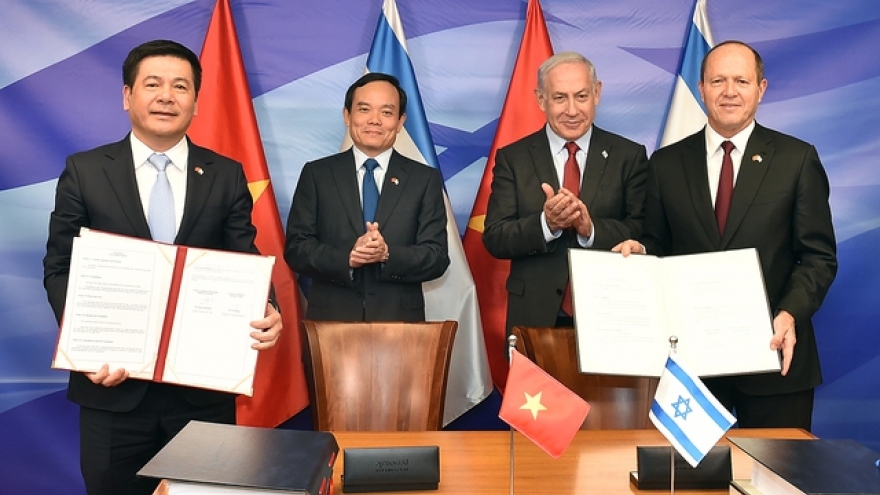Vietnam and Israel become leading important partners
VOV.VN - After 30 years since the establishment of diplomatic ties, the friendly co-operative relationship between Vietnam and Israel has continuously seen strong development, thereby making both sides become each other's leading and important partners in Southeast Asia and West Asia, respectively.

There remains ample room for the two countries to further boost comprehensive economic and trade links towards a business ecosystem for the business communities of each side in the coming time.
This assessment was made by delegates at the Vietnam-Israel Business Forum co-organised on August 15 by the Vietnam Chamber of Commerce and Industry (VCCI)’s chapter in HCM City and the Embassy of Israel in Vietnam.
Regarding investment, as of July 20, Israel has run 40 FDI projects in the country, with a total capital of more than US$140 million, thereby ranking 47th out of 148 countries and territories investing in the Vietnamese market.
The nation currently has four investment projects in Israel with a total value of roughly US$76 million.
In terms of trade, Israel represents the fifth largest trading partner and the third largest export market of Vietnam in the Middle East, as well as being the 33rd largest trading partner out of a total of more than 200 national and territorial markets that the country has imported and exported goods.
The economic structures of both nations are complementary as the import and export products of the two not only do not compete directly, but also complement each other.
In 2022, total Vietnamese import-export turnover with Israel reached US$2.2 billion, up 17.9% over the same period from 2021, of which Vietnamese export turnover to the Middle East nation hit US$785.7 million and Vietnamese import turnover from Israel stood at US$1.4 billion.
Vietnamese products which have secured a foothold in the Israeli market include mobile phones and components, seafood, agricultural products of all kinds, footwear, as well as garments and textiles.
However, according to Director of the VCCI’s HCM City chapter Tran Ngoc Liem Tran Ngoc Liem, compared with Israel's potential in science, technology, and finance, these figures for direct investment in the Vietnamese market are meager and not commensurate with the potential and needs of the two sides.
The Vietnamese Government strives to create favourable conditions for Israeli enterprises to invest more in the country in the fields of industrial production and agriculture with high technology applications, materials industry, information technology, green and clean production, and investment in industrial infrastructure development.
Simultaneously, the two countries are in the process of striving to elevate bilateral trade turnover target to US$3 billion in the time ahead.
On July 25, both sides signed the Vietnam-Israel Free Trade Agreement (VIFTA) which covers many areas of mutual interest, such as trade in goods, service, investment, rules of origin, sanitary and phytosanitary measures, customs, and government procurement.
Most notably, Israel is the first country in West Asia that the Vietnamese side has signed an FTA with, whilst Vietnam is also the first country in Southeast Asia that Israel has signed an FTA with.
The signing and implementation of the VIFTA will create a favourable premise for the country to bolster the export of key products, not only to Israel, but also have the opportunity to access other markets in the Middle East, North Africa, and Southern Europe.
In the opposite direction, besides the Vietnamese market of over 100 million people, Israeli goods and technologies have opportunities to gain access to markets in ASEAN member states, the Asia-Pacific region, and other major economies in the 16 FTAs that Vietnam has joined.
Israeli Minister of Economy and Industry Nir Barkat said the Israeli side is one of the world's leading countries in terms of technology and startups.
Along with potential of science and technology, the Israeli Government has also adopted mechanisms and policies which seek to encourage enterprises to develop, expand investment, and co-operate in developing foreign markets.
With the signing of the VIFTA, Israel is opening more doors for Vietnamese goods to penetrate directly into the domestic consumer market. Therefore, this is an opportunity for the two sides to promote trade and investment, as well as forming a business ecosystem in the business communities of the two countries.
He also suggested that the two sides consider opening a direct flight from Ho Chi Minh City to Israel soon in an effort to shorten the geographical distance and offer optimal conditions for businesses and investors to connect and share information about each other's needs and markets, thereby augmenting more effective co-operation activities.
Vo Van Hoan, vice chairman of the Ho Chi Minh City People's Committee, emphasized that the signing and implementation of the VIFTA will open up new and deeper opportunities for both sides.
The southern metropolis wishes to bolter linkages and attract Israeli businesses to invest in areas where the city is in great demand such as the digital economy, science and technology, high-tech agriculture, and renewable energy, etc. This will serve to promote investment and trade relations between Vietnam and Israel commensurate with the potential and needs of the two nations, he added.



